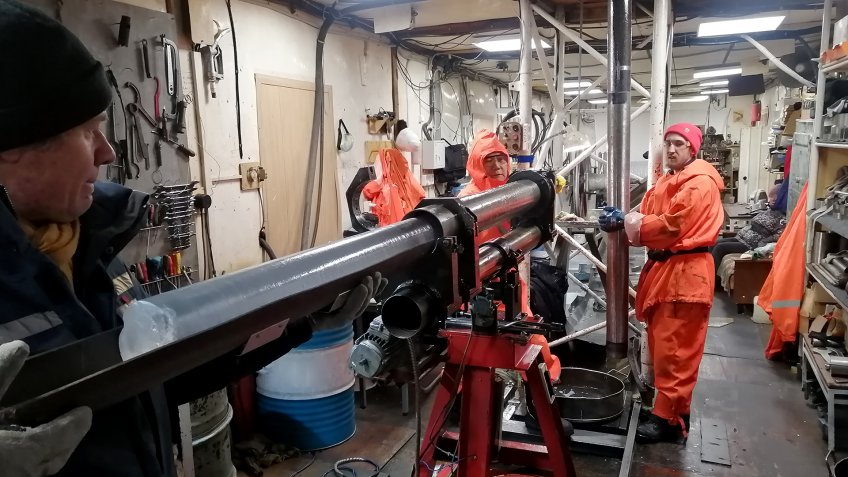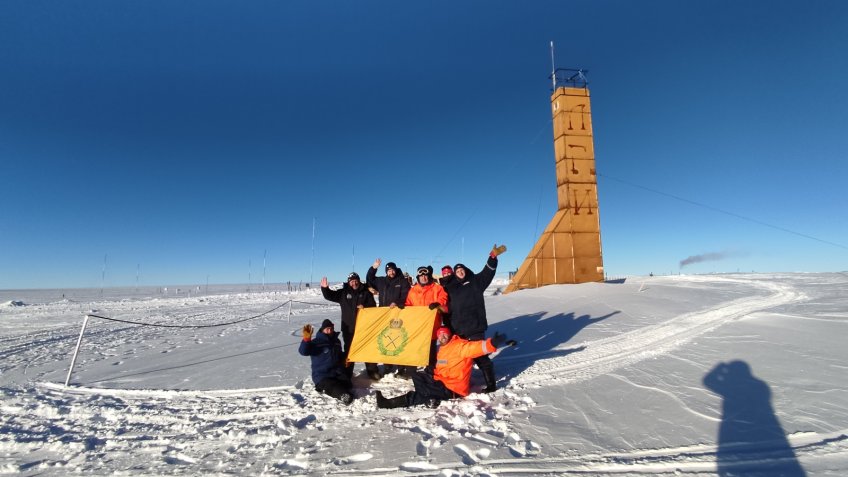
In less than a month, eight scientists from St. Petersburg Mining University are planning to go to Antarctica as part of the seasonal glacial-drilling team, which also includes representatives of the AARI. They will fly to Cape Town, climb aboard the ship "Akademik Fedorov", which in the coming days will depart from St. Petersburg, and on it will go directly to the White Continent. Then they will be taken by helicopter to the coastal research station Progress, from where on wheeled three-axle all-terrain vehicles "Burlak" the polar explorers will go to the final point of the expedition - Vostok station, located in the coldest place on Earth.
It was here that the record low temperature of minus 89.2 ° C was recorded in the history of meteorological observations. However, frost is not the only problem facing people on this lifeless white plateau, located on top of a huge glacier over three and a half kilometers high. Because of the abnormal pressure-an average of about 460 mm Hg-the oxygen content of the air there is much lower than under normal conditions. Acclimatization can be very unpleasant: headaches, nosebleeds and rapid fatigue are the usual companions of men who, no matter what, return to the Pole of Cold every year and continue their scientific research.
"A special feature of this season will be the inclusion of a geologist with geophysical skills in our team. He will not be involved in profile research at this stage, his mission, in addition to teaching drilling skills, will include testing modern geophysical equipment in the harsh conditions of Antarctica, and the answer to the question: is it possible for it to work there with the same efficiency as in the benign environment? This is necessary to create a scientific and technical groundwork for the future. Studying the ecosphere of the subglacial lake, as well as the deep phenomena occurring in the bowels of this unique continent and affecting the Earth's magnetosphere, is one of the long-term tasks set before us by the university's management", said Alexey Bolshunov, head of the Mining University research party.
Under the Vostok station, at a depth of more than 3770 meters is indeed the lake of the same name, which by its area is only slightly inferior to Lake Ladoga, but much deeper than it. For more than 10 million years it was isolated from the outside world, until the St. Petersburg scientists drilled a well to its surface in 2012 and took relict water samples.
This season, the third penetration to Lake Vostok is not planned, but the drilling operations will continue. Their purpose is to take ice cores from different horizons for further study in AARI laboratories. These studies allow to better understand what processes took place in the Earth's atmosphere in different historical periods, what climatic changes they resulted in and to make predictions for the future based on the obtained data.
Last winter (it is "summer" in Antarctica, so the air temperature ranges from minus 20 - minus 45 degrees), polar explorers raised to the surface cores formed half a million and even 600 thousand years ago. Now, by all appearances, their age will be even greater, as the task of the team includes drilling to the boundary of atmospheric and lake ice. This means that only a little over 200 meters will remain to the surface of the reservoir.
"First of all, immediately after our arrival at the station, we will conduct geophysical studies of the well, in particular, we will measure the temperature and pressure at various depths, as well as the diameters of the lower section. After that, we will compare the current readings with last year's results, which we got before we mothballed the drilling complex and left for St. Petersburg. This is necessary to understand what changes have occurred and what technological steps we need to take to ensure operational safety and minimize the possibility of emergency situations caused by jamming of the drilling rigs," Alexey Bolshunov explained.
After that, the scientists will proceed to the main stage of work. In addition to the selection of cores, they will, as usual, engage in research aimed at improving existing technologies of drilling glaciers and the development of new ones. This season, the experiments will be carried out on two stands, made in the mechanical workshops of St. Petersburg Mining University. The first one simulates the process of air transportation of ice sludge generated during drilling the upper horizons. This technology was already tested in Antarctica last season, and the stand was upgraded in spring and summer. The polar explorers believe this will provide the new results needed to develop the most productive technology possible.
"The second stand is completely new. We will use it to study the process of cutting the ice massif during the rotational motion of the crown. This technical solution was proposed by scientists at the Mining University a relatively long time ago, and there is nothing innovative about it. However, this technology has been used only for rock drilling and will be used in Antarctica for the first time. We expect that its implementation will also improve drilling efficiency," Alexey Bolshunov noted.
As always, one of the most important goals of the expedition is to strengthen the drilling and research skills of young specialists. The research party of St. Petersburg university includes four polar explorers, who last season went to the White Continent for the first time. They, of course, need to develop their professional competencies in order to learn to operate and upgrade equipment independently, without the support of their elders, as well as troubleshooting, which are inevitable in such a hostile environment, both for man and equipment.
"Most of the guys come to Vostok for the first time, and this season we will have one such person on the team, and so it is very difficult to acclimatize, both physically and psychologically. Moreover, there are cases when explorers pass the first season practically painlessly, and during the second and even the third season they feel difficulties. Everything depends on organism peculiarities. At the same time the season is short, we are working under the conditions of time pressure. This is why it's extremely important that each of us join in the work from the very first days at the station, with maximum efficiency, instead of wasting valuable time adapting to the harsh reality. Many years of experience in Vostok is the most important condition for increasing the efficiency of our research. And the fact that thanks to the management of St. Petersburg Mining University and personally the rector we annually increase the number of our staff is worth much", - summed up one of the oldest polar explorers, associate professor of Drilling Wells Department of Oil and Gas Faculty, Andrey Dmitriev.
As it is known Russian President Vladimir Putin in his recent address to the participants of the International Forum "Days of Arctic and Antarctic", which was held in Moscow, called strengthening of the scientific presence on the sixth continent as one of the priorities of strategic development of the country. He emphasized that "a lot of work will continue in the Vostok". In particular, the construction of a modern winter station.
No less important is the construction of a new drilling complex, which is required by the polar explorers due to the moral and physical obsolescence of the current one. The prospect of a third penetration into the subglacial lake, taking unique samples of water and, for the first time, bottom sediments, which will provide new scientific knowledge of the most complex physical processes that occur in the depths of Antarctica, depends directly on the speed of this project. So far, science has only a rough idea of these deep phenomena, including the geochemical carbon cycle, which affects the Earth's climate much more strongly than human activity.



